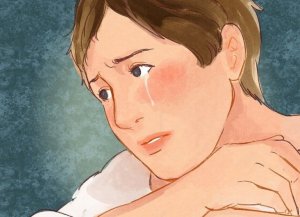Mental Tools to Help Deal with Depression

Knowledge of mental tools when we are dealing with depression is a great help in the treatment of psychological conditions.
What is depression?
Depression is a mental health condition. Sadness, guilt and self-deprivation take over those who suffer from it, and this interferes with their normal daily activities.
Depression reduces one’s interest in what they once enjoyed. It tends to start during adolescence or between the ages of 20 and 30 years old. However, children are not exempt from suffering from it.
Contrary to what had previously been thought, depression is not synonymous with weakness. It’s also not necessarily linked with lack of affection, childhood trauma or personality disorders.
The causes can be very diverse: death of a family member, emotional breakups, situations at work, serious illness, or even hormonal changes.
Statistics show that 30% of primary care patients have symptoms of depression, and that 10% end up in serious condition. One in every six people can be affected by this condition.
Symptoms of depression

Instead, they have feelings of guilt, hopelessness, abandonment, loneliness and uselessness.
In these situations, the person has a difficult time making decisions, they do not sleep much and can end up considering suicide. Also, they stop caring about their personal hygiene, their children or their pets.
Physical disorders and depression
Physical disorders can have a direct or indirect relationship with depression:
- As an example, thyroid deficiency can affect hormone levels, which can cause symptoms of depression.
- Cerebral tumors, multiple sclerosis, Parkinson’s, dementia or sleep apnea can trigger depression.
- Tuberculosis, pneumonia, and hepatitis may also play a role, among others.
- Anxiety, alcoholism or schizophrenia can also cause its appearance.
Depression and something more

At first, the person is sad and down. Their eyes are filled with tears every day for weeks at a time. They avoid eye contact and have no desire to participate in conversations.
- The persistent depressive condition lasts for two or more years. They lose their sense of humor or the ability to enjoy themselves; they are more taciturn, pessimistic and skeptical.
- In what is called “premenstrual dysphoric disorder,” the symptoms only exist during the days right before menstruation. It can start at an early age, but it disappears with menopause.
Depression: how to treat it?

In general, it does not require hospitalization, unless you are dealing with thoughts of suicide, weight loss or the condition includes heart problems.
- If the depression is light, doctor visits can complete the psychotherapy. This is a treatment that can be done individually or in groups. It helps with progressive adaptation to the pressures of life.
- If the depression goes from moderate to serious, the therapy may also come with a new generation anti-depressive drugs or heterocyclic. There are also selective serotonin re-uptake inhibitors and monoamine oxidase.
- If necessary, electroconvulsive therapy can be used. This consists of the placing of electrodes on the head that induce convulsions in the brain through the use of electrical currents. It requires general anesthesia to be carried out.
- Depression linked to the seasons in treated with phototherapy. This takes place in a box that emits light and the person has to be facing it for 30 minutes, without looking directly at it.
Fight depression
There are many mental tools that can help you deal with depression:
- Participate in activities that you’re interested in. This will increase your physical and mental energy and will help you avoid negative thoughts.
- Turn your negative thoughts into positive ones. Overall, developing self-esteem helps you avoid depression because self-esteem makes you value yourself and tolerate your flaws.
- In addition, another mechanism is to promote your assertiveness or your ability to defend your beliefs.
- The fact that you can accept your emotional states, even if they are negative, shows emotional intelligence. It’s necessary to be able to identify anxiety, anger, sadness or fear to learn how to cope with it.
- In life, your goals motivate you and keep us going. Because of this, a stimulus that helps you get over depression is working for predetermined goals.
- Relaxation as a way to loosen up your muscles and your mind is very important.
- Meditation is also a very effective practice.
All cited sources were thoroughly reviewed by our team to ensure their quality, reliability, currency, and validity. The bibliography of this article was considered reliable and of academic or scientific accuracy.
- Brieger, P., & Menzel, S. (2018). Depression. Nervenheilkunde. https://doi.org/10.1055/s-0038-1670565
- Ingram, R. (2012). Depression. In Encyclopedia of Human Behavior: Second Edition. https://doi.org/10.1016/B978-0-12-375000-6.00129-4
- The National Institute for Health and Care Excellence. (2009). Depression: The treatment and management of depression in adults. NICE guidelines [CG90]. https://doi.org/10.1016/j.jpcs.2014.01.022
- Beck, A. T., & Alford, B. A. (2009). Depression: Causes and Treatment. Journal of Chemical Information and Modeling. https://doi.org/10.1017/CBO9781107415324.004
- Simkin, D. R., & Black, N. B. (2014). Meditation and mindfulness in clinical practice. Child and Adolescent Psychiatric Clinics of North America. https://doi.org/10.1016/j.chc.2014.03.002
This text is provided for informational purposes only and does not replace consultation with a professional. If in doubt, consult your specialist.








